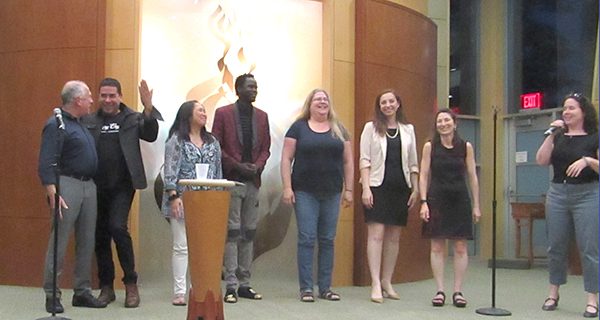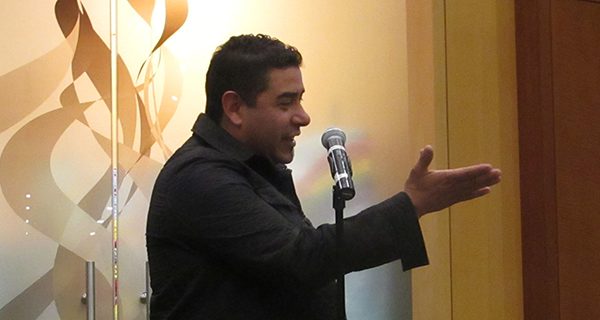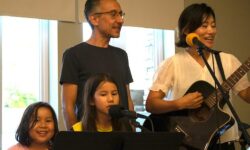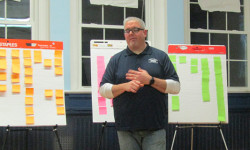[ccfic caption-text format="plaintext"]
By Amelia Tarallo
Hometown Weekly
Each person who immigrates to the United States of America comes to this country with a story about their journey here. Some of those tales are more easy going, while others are decades in the making. On Wednesday, June 12, the community was invited to hear some of these stories at Temple Beth Shalom. Speakers at Wednesday night’s Suitcase Stories program, organized by the Temple Beth Shalom Tzedek (social justice) and brought by the International Institute of New England, shared stories ranging from dangerous border crossing to war-torn countries, to reuniting families, to childhood memories.
After Cheryl Hamilton’s brief introduction, the stories began, starting with seasoned story-teller Ron Goldman to kick the night off. Goldman spoke of his childhood in South Africa and the sudden change brought on by his parents’ decision to move to the United States. He reflected on how his parents gave up his childhood dog, and the crippling feeling of watching her being taken away. Goldman related these feelings to those of his mother’s leaving her own family as she escaped Nazi capture while her kin perished. Though it has been years since he has moved to the United States, ever since, he has been haunted by the look Honey gave him as she was being taken away.
Georgina Arrieta-Ruetenik talked her experience of moving from the Phillipines to the States. When she was five years old, Georgina lived in the Philippines with her father, while her mother lived in Brooklyn to become a nurse. Georgina recalled a time when her mother had sent a package with clothes in it, all the way from the United States. However, the clothes were too small, disappointing young Georgina. She felt that her mother had forgotten how old she was. About a year after, Georgina and her father immigrated to Brooklyn and were reunited with her mother. “The chill of the October air could not compete with her warm embrace,” she said.
Fast-forward to just a year ago. Georgina had been living in Needham for 16 years; she was now a mother herself and a valued community member. With a news cycle filled with stories of separated families and images of children with no parents at all, Georgina couldn’t help but feel the itch to do something. Before she realized it, she was organizing a march in Needham, accompanied by the hashtag “#FamiliesBelongTogether." Since then, Georgina has continued to organize meetings to raise awareness that all families deserve to be together.
Vicki Krupp began her story with a brief discussion of her Starbucks name (the name she uses to order Starbucks). For a long time, Vicki wished she had a different name, but recalled how her own family had changed their name to Levy. When her ancestors immigrated to this country, they changed their name to make it clear to anyone who knew them that they were Jewish to avoid having to explain that they kept Kosher. For years, the family lived in Georgia running a store, living paycheck to paycheck. It wasn’t until the popularity of Levi’s jeans exploded that the family’s luck changed; people thought that the jeans could be bought at the Levy’s store. Though the family now had money to spend, her grandfather always thought about when they had none at all, and were just beginning in this country “with nothing but a push cart and a donkey.”
Sandra Rizkallah discussed her experience of immigration from a different point of view. She spent months of her life trying to get a youth band from Zimbabwe to the United States to play at a concert she was organizing. No matter how hard she tried, she could not manage to get enough money or obtain the visas for the group. But Sandra did not quit. She made another attempt to get a band from Africa to play at one of her concerts. After weeks of talking to fellow concert organizers, some from as far away as the Netherlands, Rizkallah picked the band up at the airport. Sandra ended her story with some words of encouragement that she tells her students: “If a magic carpet ends up at their door, they have to get on.”
Francisco Mendez was 14 when he swam across the Rio Grande to leave Mexico. After traveling for days, he ended up Texas and realized it wasn’t the American dream he saw. “Everyone spoke Spanish and I wanted to learn English,” he explained. Finally, Francisco made it to Waltham, where his sister was living, and began learning the language. Soon, he took on every job he could, eventually working at a family member’s restaurant. Soon, Mendez will be opening his own restaurant in Needham.
Renaz Moulla recalled her childhood spent in Syria, starting with the Christmas when she received a Barbie Dreamhouse. Her father owned a successful factory, allowing Renaz to receive such lavish gifts, unlike many of the other Kurdish Muslims living in Syria. But the family’s life changed when war broke out and Renaz’s father lost his factory. Soon, the entire country seemed to have turned upside down. Years later, on Christmas Eve, Renaz arrived in the United States with her children. There was no family waiting for them, like everyone else. Instead, waiting for Renaz was a land of opportunity and new friends. To end her story, Renaz recalled some advice her mother had given to her: “Wear your insecurities like a crown.” Since then, Renaz has learned to love her worries about being a single mom and a Kurdish Muslim.
There wasn’t a dry eye in the room by the end of the showcase. Each audience member seemed to identify with the message of at least one story, whether it be the separation and loss of family, the want for a better life and the need to work hard for it, or making dreams come true.
Attendees left the event with a new appreciation for their own lives, and some even commented that they now felt the urge to help immigrants coming to this country.


























